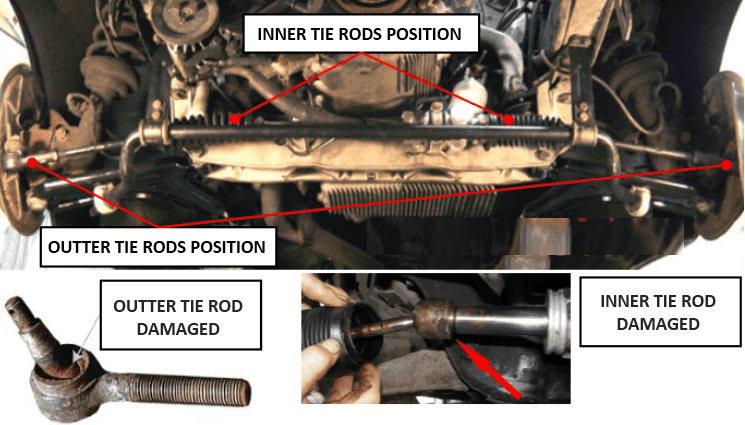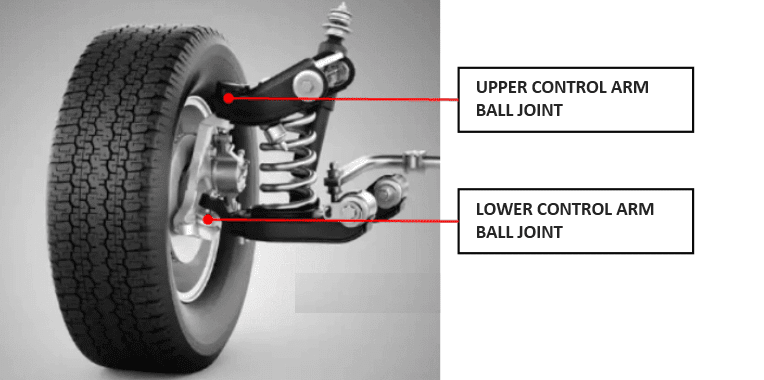Possible causes of clunking noise in front end
Driving with a noisy condition on the car's front wheels is quite worrying, especially if the noises that appear are often enough and propagate on a fairly even road.
Generally, the clunking noise on the front wheels will occur if we pass through an uneven or bumpy road, but if the damage condition is severe enough, then the clunking noise can be felt up to the cabin when passing a reasonably flat road.
The main factor that causes this noise to appear is that cars often pass through potholes, especially when driven at a fairly high speed. Many components on the car suspension become worn-out, saggy, and have to be replaced.
So, what is the cause of clunking noise in the front wheels? Here are some of the components on the vehicle that cause the clunking noise in the front wheels.
1. Front stabilizer rubber bushing and joints are worn-out
The first thing that often causes the clunking noise in the front wheels of a car is the damage to the front stabilizer bar rubber bushing and joints, which are worn out. Usually, the rubber bushing damage is mostly due to the usage factor.
Rubber bushings and joints that have been used for a long time will gradually become hard, wear out, break and even fall out of place. As a result, the steel stabilizer bar will collide with the body, causing a gurgling sound that can hear from inside the cabin.
2. Excessive worn-out of the inner and outer tie rod
The next cause of the clunking noise in the car's front wheel is that the ball joint on the inner tie rod and outer tie rod is worn out excessively. Damage to ball joints on inner tie rods and outer tie rod ends is often caused by service life and the use of vehicles on damaged/perforated roads.
Excessive worn-out of the inner and outer tie rod will cause a clunking noise that can hear in the cabin. To check it, lift the car wheel safely, then shake the car wheel right and left. If the tire is shaking and doesn't tighten when you shake it from right to left, the inner tie rod and outer tie rod are most likely damaged.
3. Lower control arm and upper control arm ball joints are worn out
The lower control arm and upper control arm ball joints can also cause clunking noise in the front wheels. The length of use and the frequent use of cars on potholes are common causes of ball joints to worn and saggy.
To check the upper arm and lower arm ball joint, rock the tire up and down. If the tire feels wobbly and not tight, it could be that the lower arm / upper arm ball joint is worn out and causing a clunking noise.
4. Lower control arm bushings are worn, broken, or damage
The next cause of the clunking noise in the car's front end is the damage of the lower arm bushing. Lower arm rubber bushings that are broken, worn, torn can cause the car's front wheels to make a clunking noise due to the lower arm metal colliding with the body and frame of the car. The cause is the same, service life or often use on bumpy roads, causes the lower arm rubber bushing to be damaged.
5. Upper control arm bushings are worn, broken, or damage
Several car models use a double-wishbone suspension. This suspension uses a lower arm and an upper arm. Especially for cars with double wishbone suspension, the upper arm uses rubber bushings.
If the rubber bushing is damaged, worn, or broken, this damage can also cause the clunking noise in the car's front wheels. Therefore, do also check in this section.
Read also:6. The front shock absorbers are damaged
A shock absorber that has been damaged, saggy and worn-out can cause the clunking noise in the front wheels. The absence of material to withstand the damping effect in the shock absorber causes collisions between the iron bar and the tube inside the shock absorber. The collision also makes the clunking noise.
A shock absorber that is already weak, saggy, and worn-out can be marked by uncomfortable driving conditions. The car feels unsteady and swings when it is around corners or when passing through a damaged road.
7. The shock absorber bearing and rubber support is worn out, and damage
The last thing that is known to be the cause of the clunking noise in the car's front wheel is the damage to the shock absorber bearing and rubber support. Yes, to put the shock absorber so that it is strong and tight, support is often used to attach to the vehicle body.
This support has a bearing in the middle, and there is rubber around it. Damaged bearings and rubber can cause the shock absorber to become saggy so that which can cause a clunking noise on the front wheels.






